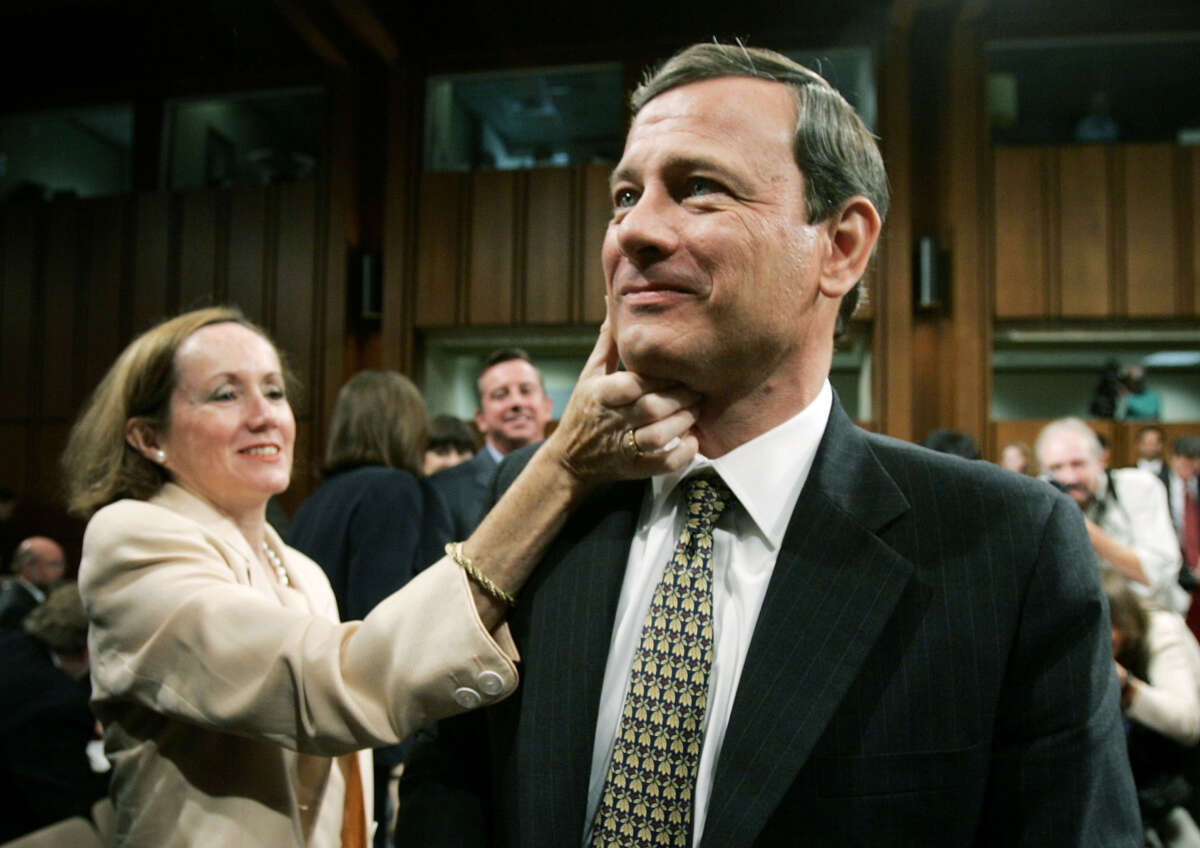Honest, paywall-free news is rare. Please support our boldly independent journalism with a donation of any size.
Just two years after John Roberts was confirmed as Supreme Court chief justice, his wife Jane Roberts began a career as a law recruiter — a move which netted the couple millions of dollars, a new report has revealed.
Records from Jane Roberts’s employer Major, Lindsey & Africa show that the lawyer-turned-recruiter made $10.3 million in commissions between 2007 and 2014. During that time, Roberts placed lawyers at top firms; though Insider, which first published the documents, found no evidence that the recruits had personally argued cases in front of her husband, it is likely that she placed clients in firms that have had business at the High Court.
This amount of compensation is at the higher end for legal recruiters, and experts say that Jane Roberts’s ability to perform as a recruiter — a job in which connections across the industry are invaluable — was likely boosted by her marriage to the highest-ranking judge in the U.S.
The details of Jane Roberts’s compensation were included in a complaint filed in December, with documents sent to congressional committees. The complaint was filed by Kendal B. Price, a colleague of Jane Roberts at Major, Lindsey & Africa.
“When I found out that the spouse of the chief justice was soliciting business from law firms, I knew immediately that it was wrong,” Price said in an interview with Insider. “During the time I was there, I was discouraged from ever raising the issue.”
“And I realized that even the law firms who were Jane’s clients had nowhere to go. They were being asked by the spouse of the chief justice for business worth hundreds of thousands of dollars, and there was no one to complain to,” Price continued. “Most of these firms were likely appearing or seeking to appear before the Supreme Court. It’s natural that they’d do anything they felt was necessary to be competitive.”
In financial disclosures, John Roberts characterized his wife’s compensation as salary rather than commission, which Price described in the affidavit as “misleading.” Pace University law professor Bennett Gershman went further and said that the alleged mischaracterization of the income is against disclosure laws.
“Characterizing Mrs. Roberts’ commissions as ‘salary’ is not merely factually incorrect; it is incorrect as a matter of law,” Gershman wrote in a memo supporting the complaint. “The legal distinction between these terms is clear, undisputed, and legally material. If the Chief Justice’s inaccurate financial disclosures were inadvertent, presumably he should file corrected and amended disclosures.”
Revelations over Jane Roberts’s commission add to a growing mountain of scandals and seeming improprieties about Supreme Court justices that have been reported in the past month, beginning with a bombshell investigation which revealed that Clarence Thomas has been secretly accepting hundreds of dollars’ worth of gifts and trips from billionaire GOP megadonor Harlan Crow and rubbing shoulders with influential conservative activists.
A report from Politico found that right-wing justice Neil Gorsuch received hundreds of thousands of dollars from the sale of a large piece of property to the CEO of a prominent law firm that has argued in front of the Supreme Court several times just days after Gorsuch was confirmed in 2017; seemingly in violation of reporting requirements, Gorsuch never disclosed the transaction, raising questions about conflicts of interest.
As these scandals have played out, John Roberts has refused a request to appear before the Senate in a hearing on the ethics of Supreme Court justices and even led all nine justices in a letter stating their opposition to being bound to a code of ethics. The judges’ response has contributed to a crisis of legitimacy for the Supreme Court in a time when it is bucking norms and lurching to the right.
A terrifying moment. We appeal for your support.
In the last weeks, we have witnessed an authoritarian assault on communities in Minnesota and across the nation.
The need for truthful, grassroots reporting is urgent at this cataclysmic historical moment. Yet, Trump-aligned billionaires and other allies have taken over many legacy media outlets — the culmination of a decades-long campaign to place control of the narrative into the hands of the political right.
We refuse to let Trump’s blatant propaganda machine go unchecked. Untethered to corporate ownership or advertisers, Truthout remains fearless in our reporting and our determination to use journalism as a tool for justice.
But we need your help just to fund our basic expenses. Over 80 percent of Truthout’s funding comes from small individual donations from our community of readers, and over a third of our total budget is supported by recurring monthly donors.
Truthout’s fundraiser ended last night, and we fell just short of our goal. But your support still matters immensely. Whether you can make a small monthly donation or a larger one-time gift, Truthout only works with your help.
